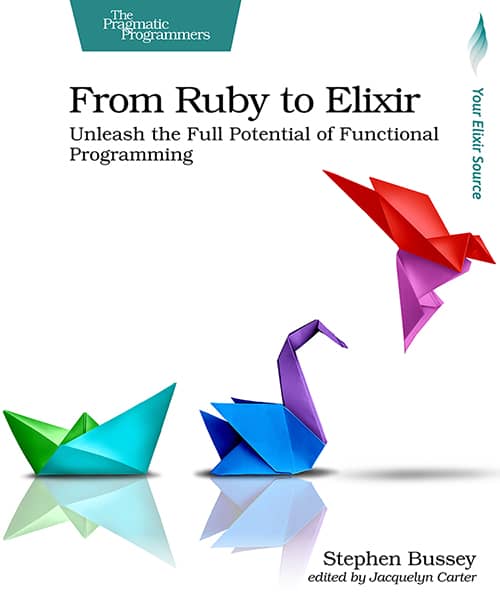Stephen Bussey @sb8244
edited by Jacquelyn Carter @jkcarter
Elixir will change the way you think about programming. Use your Ruby experience to quickly get up to speed so you can see what all of the buzz is about. Go from zero to production applications that are reliable, fast, and scalable. Learn Elixir syntax and pattern matching to conquer the basics. Then move onto Elixir’s unique process model that offers a world-class way to go parallel without fear. Finally, use the most common libraries like Ecto, Phoenix, and Oban to build a real-world SMS application. Now’s the time. Dive in and learn Elixir.
Whether you’re a seasoned Ruby developer looking to expand your skill set or a programming beginner looking for a solid foundation in Elixir, this book has what you need to get up to speed quickly. Elixir is a functional language with a fairly small footprint. This makes it easier to learn and put into production than other languages. Plus, it’s built on forty-year-old foundations that give your applications rock-solid stability.
The first part of this book is all about developing expertise in the language. Learn about the core data types, build application data structures, enumerate over data, and use pattern matching to control the flow of an application. Elixir has an amazing process model that allows for (actually) easy parallel processing. Learn how to tap into this process model so you can leverage that power yourself.
The second part of this book builds a real-world application using the most important libraries in a web developer’s toolbox. Each library is compared to its similar Ruby library so you’ll quickly see similarities and differences. We’ll use Ecto, Phoenix, and Oban to build a SMS application powered by Twilio.
What are you waiting for? Tap into your Ruby knowledge and start building scalable Elixir applications today.
- Full details: From Ruby to Elixir: Unleash the Full Potential of Functional Programming by Stephen Bussey
- View this book’s portal and details on how to post errata and suggestions here.
Don’t forget you can get 35% off with your Devtalk discount! Just use the coupon code “devtalk.com" at checkout ![]()























